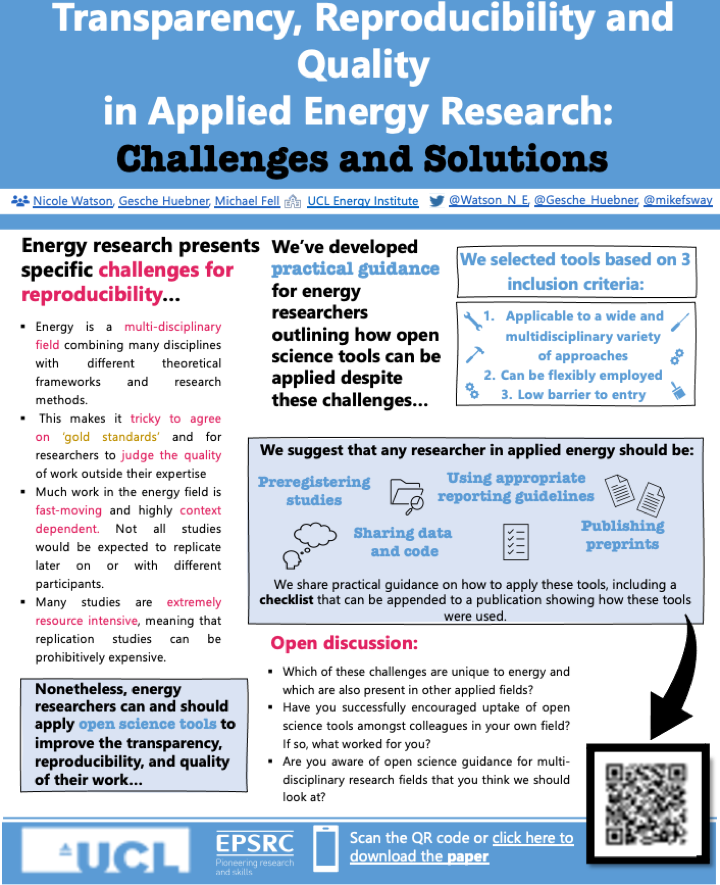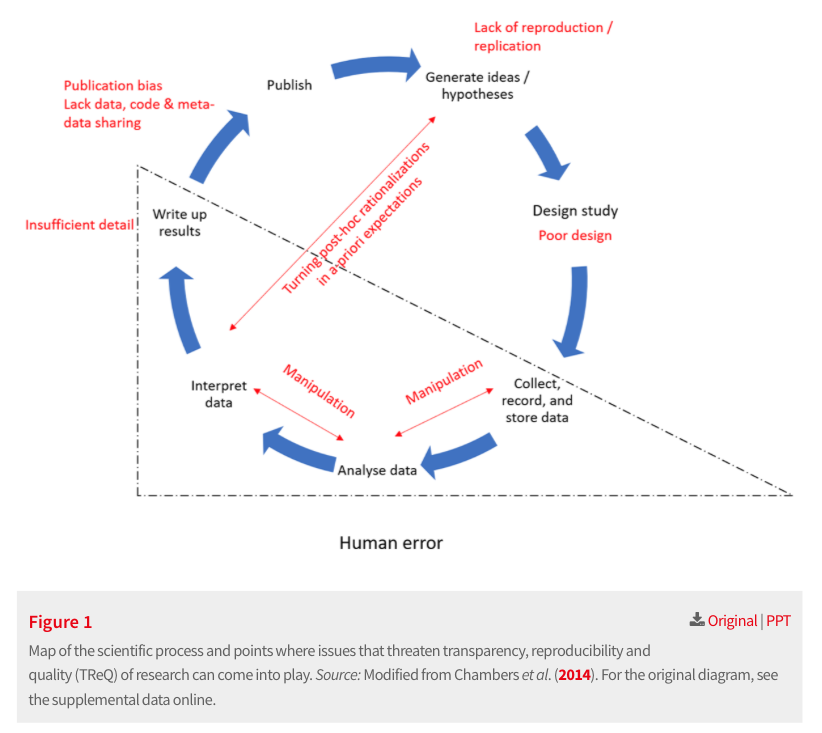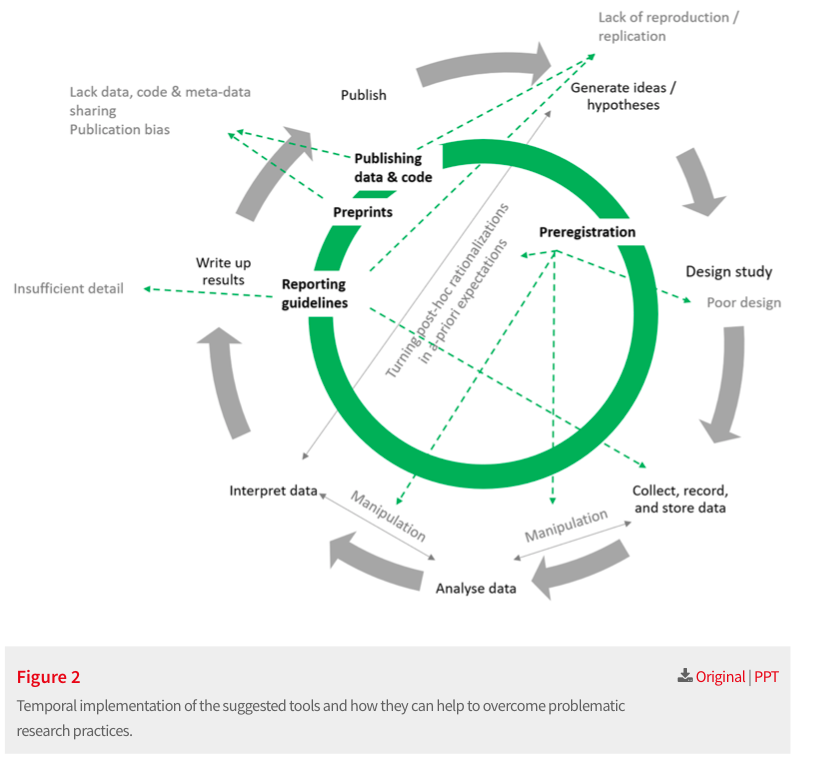Some good news in the midst of the doom-scrolling: new paper with @GescheHuebner and @mikefsway is now online #OpenAccess @BuildingsCities  Improving energy research practices: guidance for transparency, reproducibility and quality
Improving energy research practices: guidance for transparency, reproducibility and quality
http://doi.org/10.5334/bc.67 THREAD 1/15
1/15
 Improving energy research practices: guidance for transparency, reproducibility and quality
Improving energy research practices: guidance for transparency, reproducibility and quality http://doi.org/10.5334/bc.67 THREAD
 1/15
1/15
This one's for all #energy researchers & #OpenScience advocates, particularly those in multi-disciplinary fields. We discuss the importance of transparency, reproducibility, and quality in energy research & outline 4 tools for improving it (for a TL;DR, check out our poster)
2/15
2/15
The tools we focus on are:
 Pre-analysis plans (i.e. outlining exactly how data will be cleaned/analysed prior to data collection)
Pre-analysis plans (i.e. outlining exactly how data will be cleaned/analysed prior to data collection)
 Using appropriate reporting guidelines
Using appropriate reporting guidelines
 Publishing pre-prints
Publishing pre-prints
 Sharing data/code
Sharing data/code
But why do these tools matter?
3/15
 Pre-analysis plans (i.e. outlining exactly how data will be cleaned/analysed prior to data collection)
Pre-analysis plans (i.e. outlining exactly how data will be cleaned/analysed prior to data collection) Using appropriate reporting guidelines
Using appropriate reporting guidelines Publishing pre-prints
Publishing pre-prints Sharing data/code
Sharing data/code But why do these tools matter?
3/15
The importance of openness & transparency in research is gaining recognition - without knowing enough details about a study, it can be hard to tell whether conclusions are justified, check whether findings can be reproduced, and bring evidence together 
4/15

4/15
Transparency is also important for addressing bad practices, such as poor study design, inadequate reporting, and manipulation of data/findings, which can make effects seem more significant than they really are (diagram adapted from @chrisdc77)
5/15
5/15
Although cases of outright fraud do exist (see @sTeamTraen @jamesheathers for great examples of exposing it), bad practices aren't always intentional. It's still a problem if policy is built on effects that don't exist or don't apply in the context they're deployed in
6/15
6/15
Some scientific disciplines recognise they have a #ReplicationCrisis, where results of many studies can't be reproduced (see https://nobaproject.com/modules/the-replication-crisis-in-psychology). But, in #energy research, this is typically a niche concern 
7/15

7/15
Why is this? #Energy is a fast-changing field with lots of emphasis on contextual factors. Technologies evolve rapidly, as do factors predicting behaviour. For this reason, trying to directly replicate studies doesn't always make sense
8/15
8/15
#EnergyResearch is also multi-disciplinary, combining engineers, physicists, economists, psychologists, political scientists, & many more. This makes it tricky to find consensus on  gold-standards
gold-standards and for researchers to judge the quality of work outside their discipline
and for researchers to judge the quality of work outside their discipline
9/15
 gold-standards
gold-standards and for researchers to judge the quality of work outside their discipline
and for researchers to judge the quality of work outside their discipline9/15
Finally, on a practical level, a lot of energy research is extremely time and resource intensive 
 This makes it much harder to incentivise and justify replication studies, particularly given journals' preference for novel and significant findings
This makes it much harder to incentivise and justify replication studies, particularly given journals' preference for novel and significant findings
10/15

 This makes it much harder to incentivise and justify replication studies, particularly given journals' preference for novel and significant findings
This makes it much harder to incentivise and justify replication studies, particularly given journals' preference for novel and significant findings 10/15
Despite all this, we argue that certain tools to improve #transparency, #reproducibility and #quality can (and should!) be applied in the energy field. Our tools (pre-analysis plans; pre-prints; open data/code; reporting guidelines) were selected based on 3 criteria...
11/15
11/15
1) Applicable to wide, multidisciplinary variety of research approaches
2) Flexible, so researchers can use them in ways most useful to them, rather than feeling constrained by them
3) Low barrier to entry i.e. easy to pick up & require little specialist knowledge



12/15
2) Flexible, so researchers can use them in ways most useful to them, rather than feeling constrained by them
3) Low barrier to entry i.e. easy to pick up & require little specialist knowledge



12/15
We discuss benefits of these tools & how they can overcome bad practices. We share practical advice on applying them (incl. servers for sharing pre-analysis plans & pre-prints) + a checklist that can be added to publications showing how #OpenScience practices were used
13/15
13/15
Although our paper focuses on #energy research, the tools selected (as well as the publication checklist!) should also be applied in other #multidisciplinary or applied fields 14/15
We're keen to chat with researchers in other multi-disciplinary fields on the challenges of applying #OpenScience practices and how to encourage uptake of OS tools. This may be of interest to @ukrepro @ReproducibiliT @OSFramework @UCLopenscience @hertzpodcast @openscience 15/15
15/15
 15/15
15/15

 Read on Twitter
Read on Twitter




